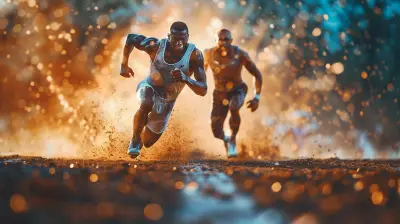Beyond the Podium: Stories of Grace and Sportsmanship in Sports
2 August 2025
When we think about sports, our minds often jump straight to the intense competition, the final scores, the dazzling trophies — basically, the glory that comes with standing on the podium. But what if I told you the real magic happens off the podium? Yup, beyond the medals and headlines, there's a whole world of heartwarming, tear-jerking stories about compassion, integrity, and human connection.
In this article, we're diving deep into the lesser-celebrated side of sports — the moments of grace, humility, and true sportsmanship that restore our faith in humanity. Ready for some goosebumps? Let's jump in.
What Is Sportsmanship Really About?
Alright, before we go knee-deep in stories, let’s set the stage. Sportsmanship isn’t just about shaking hands after a match or saying “good game.” It’s a mindset. It’s about playing fair, respecting your rivals, showing humility in victory, and dignity in defeat.To put it simply, sportsmanship is what makes sports beautiful. It shines brightest when the stakes are high, emotions are wild, and the pressure could crush steel. Yet, amid all that chaos, some athletes choose kindness, even when it’s easier not to.
The Power of a Helping Hand: Abbey D'Agostino and Nikki Hamblin
Let’s rewind to the 2016 Summer Olympics in Rio. In the middle of the women’s 5,000-meter race, American runner Abbey D’Agostino and New Zealand’s Nikki Hamblin collided and tumbled to the ground. It could’ve been the end of the race for both of them. But what happened next? Goosebumps.Instead of scrambling to get ahead, Abbey helped Nikki up, saying, “Get up, we have to finish this.” Moments later, Abbey collapsed again due to a torn ACL. This time, Nikki stayed with her until medical staff arrived.
Two athletes from two different continents. No medals won. But their act of selflessness went viral, and they both received the Fair Play Award. That’s sportsmanship. That’s grace.
Victory Second, Humanity First: Luz Long and Jesse Owens
Let’s go even further back — 1936 Berlin Olympics. Nazi Germany hoped to use the event to showcase Aryan supremacy. Enter Jesse Owens, an African-American athlete who shattered those illusions with four gold medals.But before the cheers, there was a moment of doubt. Owens was struggling in the long jump qualifiers. That’s when German athlete Luz Long stepped in. He gave Owens some friendly advice on adjusting his takeoff point. Owens took the advice — and nailed his jump.
Long could’ve kept quiet, watched his rival fumble, and secured his spot. But nope. He helped Owens compete at his best, even if it meant losing. They became friends, and Owens later said Long was the one who really deserved the gold in sportsmanship.
A Lesson in Humility: Roger Federer and Rafael Nadal
It’s impossible to talk about grace in sports without mentioning Roger Federer and Rafael Nadal. These tennis titans have battled each other for years — epic matches, nail-biting tie-breakers, historical finals. Yet their rivalry is wrapped in deep mutual respect.Remember the 2009 Australian Open? Nadal defeated Federer in a grueling five-set match. Afterward, Federer was in tears during the trophy ceremony, overwhelmed by the loss. Most winners would bask in the glory. Not Nadal. He walked over, comforted Federer, and said words that melted hearts around the world.
These two giants have set the gold standard for sportsmanship not just through their actions, but through their words, support, and genuine admiration for each other.
When the Crowd Becomes the Hero: Derek Redmond and His Dad
Barcelona 1992. The men’s 400-meter semifinal. British runner Derek Redmond was a favorite. But halfway through the race, disaster struck — a torn hamstring. He collapsed in pain, race over.Or so we thought.
Redmond got back up. Limping, crying, determined to finish what he started. Then a man broke through security and bolted onto the track — it was his father, Jim.
Arm around his son, they finished the race together. The crowd went wild.
Derek didn’t win a medal. But that moment? It became one of the most iconic in Olympic history. Because sometimes, the greatest victory is simply not giving up — and not doing it alone.
Fair Play Over Fame: Ivan Fernandez and Abel Mutai
Picture this: a cross-country race in 2013. Kenyan runner Abel Mutai was leading but mistakenly stopped a few meters short of the finish line, thinking he had already won. Spanish runner Ivan Fernandez was right behind him and had the perfect chance to steal the victory.Did he? Nope.
Instead, Ivan slowed down, gestured to Abel to keep going, and essentially pushed him over the finish line.
When asked why he didn’t take advantage of the situation, Ivan said, “What would be the merit of my victory? What would be the honor of that medal?” Mic. Drop.
Grace Under Fire: Simone Biles Redefines Courage
Simone Biles, one of the most decorated gymnasts ever, made headlines in the 2021 Tokyo Olympics — but not for a medal-winning performance. Instead, she made the bold choice to withdraw from several events due to mental health concerns.Some praised her. Others criticized her. But Simone stood firm.
What’s graceful here? Her honesty, her bravery, and her advocacy for mental health in sports. She showed the world that vulnerability is not weakness — it’s strength. By prioritizing her well-being, she sent a powerful message: No medal is worth sacrificing your peace of mind.
When Rivals Become Teammates: North and South Korea at PyeongChang
Sports has this uncanny ability to bring people together who are worlds apart. Case in point: the 2018 Winter Olympics in PyeongChang, South Korea. For the first time in Olympic history, athletes from North and South Korea competed together in a unified women’s ice hockey team.Sure, they didn’t win a medal. But their presence on the ice spoke louder than any anthem. It was a moment of diplomacy, peace, and unity through sport. Pretty powerful stuff.
It’s Not Always About the Win
Let’s be honest — we all love a good underdog victory or a last-minute goal. But some of the most enduring sports memories don’t involve a scoreboard. They involve emotion, empathy, and ethics.Think about moments when players stop to help an injured opponent, or when athletes donate their prize money to charity. They're not doing it for headlines. They're doing it because that’s what good humans do.
Why These Stories Matter
You might be wondering, “Okay, this is nice and all… but why does it matter?”Here’s the deal: Sports are a reflection of life. They magnify our struggles, our triumphs, and everything in between. When we see athletes at the top of their game showing integrity, compassion, and grace, it inspires us to be better — not just on the field, but in real life.
Plus, in a world obsessed with winning, these stories remind us that how you play the game is just as important as the result. Maybe even more so.
How to Promote Sportsmanship in Everyday Sports
You don’t have to be in the Olympics to show sportsmanship. Whether you're in a local soccer league, playing pickup basketball, or just cheering from the sidelines, you can spread grace wherever you are.Here are a few ways:
- Respect the game – Play fair, follow the rules.
- Respect your rivals – Celebrate skill, not just your own.
- Be a good loser AND a humble winner – Both are tests of character.
- Speak up – Call out bad behavior, and lift others up.
- Lead by example – Especially around kids. They’re always watching.
Final Thoughts: The True Spirit of Sports
At the end of the day, podiums rust, records break, and trophies gather dust. But those moments of compassion and courage? They live on. They’re the stories we tell for generations. They remind us that sports aren't just about being the best — they’re about being your best self.So the next time you watch a game, look beyond the score and the spotlight. You just might see something even more inspiring — a glimpse of what it truly means to be human.
all images in this post were generated using AI tools
Category:
Sportsmanship AwardsAuthor:

Preston Wilkins
Discussion
rate this article
1 comments
Natalia Price
This article beautifully highlights the often-overlooked moments of humility and kindness in sports. It reminds us that true victory lies not just in medals but in the grace and sportsmanship displayed by athletes on and off the field.
August 24, 2025 at 11:37 AM

Preston Wilkins
Thank you for your thoughtful comment! I'm glad the article resonated with you and highlighted the importance of humility and kindness in sports.


